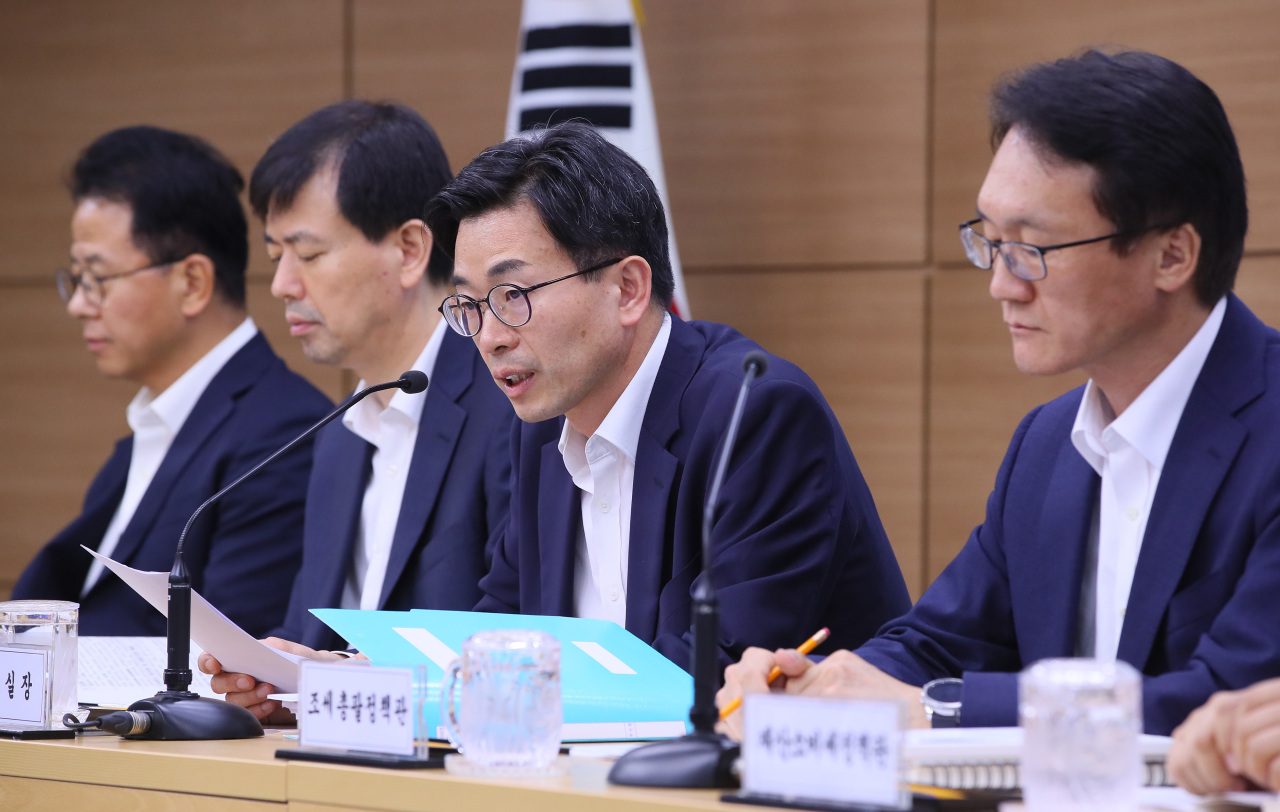The South Korean government announced Thursday that it plans to raise the tax credit rate for corporate facility investment and research and development in an effort to stimulate the economy by lifting the tax burden on firms.
The government’s announcement of its 2019 tax code revision bill, comes amid an escalating trade row between Korea and Japan, after Tokyo placed export restrictions on key materials needed for semiconductors and display screens, as well as a slew of pessimistic economic indices including a slashed economic growth outlook of 2.2 percent for this year by the central bank.
 |
Officials from the Ministry of Finance and Economy attend a press briefing held Thursday. (Yonhap) |
In its tax code revision bill, the Ministry of Economy and Finance said it plans to temporarily raise the tax credit rate for facility investment from the current 1 percent to 2 percent. The hike will be effective next year, if the parliament passes the bill by the end of 2019.
The rate for small and medium-sized businesses will also be raised to 10 percent from the current 7 percent.
The tax credit rate for facility investment was lowered in 2017 from the previous 3 percent to 1 percent for conglomerates or large businesses, but it has only resulted in lackluster corporate investments, which the current administration aims to revitalize.
Regarding research and development, it has added system semiconductors and biobetters -- drugs that have improved over the original -- to the list of technologies eligible for tax support.
The revised law will also allow firms to receive tax benefits in overseas outsourcing of experiments, especially clinical trials for local and pharmaceutical companies. Only projects carried out with local companies or laboratories are currently eligible for tax support.
The government plans to cut the surtax tied to the inheritance tax, when largest shareholders of large businesses decide to transfer their stocks to family members. For large businesses, the surtax rate will be adjusted to 20 percent from the current 30 percent, while the rate for SMEs will be abolished.
At the moment, the country charges a 50 percent inheritance tax for assets worth more than 3 billion won ($2.5 million), but an additional 30 percent is levied when the largest shareholder with more than 50 percent stake in a large company inherits the assets, which pushes up the total tax rate to a maximum of 65 percent.
For SMEs, the extra rate currently amounts to 15 percent.
The current death tax rates are the highest among the Organization for Economic Cooperation and Development member countries.
But the corporate tax will be left untouched, according to the ministry, saying only 101 large Korean companies here pay the highest rate of 25 percent.
Experts showed mixed reactions to the government’s new tax plans, saying that while the bill may be “appropriate” for the current state of the economy, stronger steps still need to be taken.
“It is an appropriate measure to expand support for corporate and R&D investment, invigoration of export and domestic demand, along with alleviation of pressure stemming from current laws surrounding corporate succession,” said Lee Kyung-sang, director of economic research at the Korea Chamber of Commerce and Industry.
But mentioning Japan’s latest export restrictions, he added, “There are, however, hopes for stronger measures regarding tax support for research and development that could help the production of domestic materials.”
Korea Enterprises Federation, a business lobbying group here, also called the latest bill a “positive move,” but “insufficient for economic agents to actually be aware of its effects.” It added that the government must address and revise corporate tax laws in order to invigorate the economy.
The ministry is slated to submit the tax revision bill to parliament on Sept. 3 for approval.
By Jung Min-kyung (
mkjung@heraldcorp.com)




![[Herald Interview] 'Trump will use tariffs as first line of defense for American manufacturing'](http://res.heraldm.com/phpwas/restmb_idxmake.php?idx=644&simg=/content/image/2024/11/26/20241126050017_0.jpg)

![[Health and care] Getting cancer young: Why cancer isn’t just an older person’s battle](http://res.heraldm.com/phpwas/restmb_idxmake.php?idx=644&simg=/content/image/2024/11/26/20241126050043_0.jpg)

![[Graphic News] International marriages on rise in Korea](http://res.heraldm.com/phpwas/restmb_idxmake.php?idx=644&simg=/content/image/2024/11/25/20241125050091_0.gif)